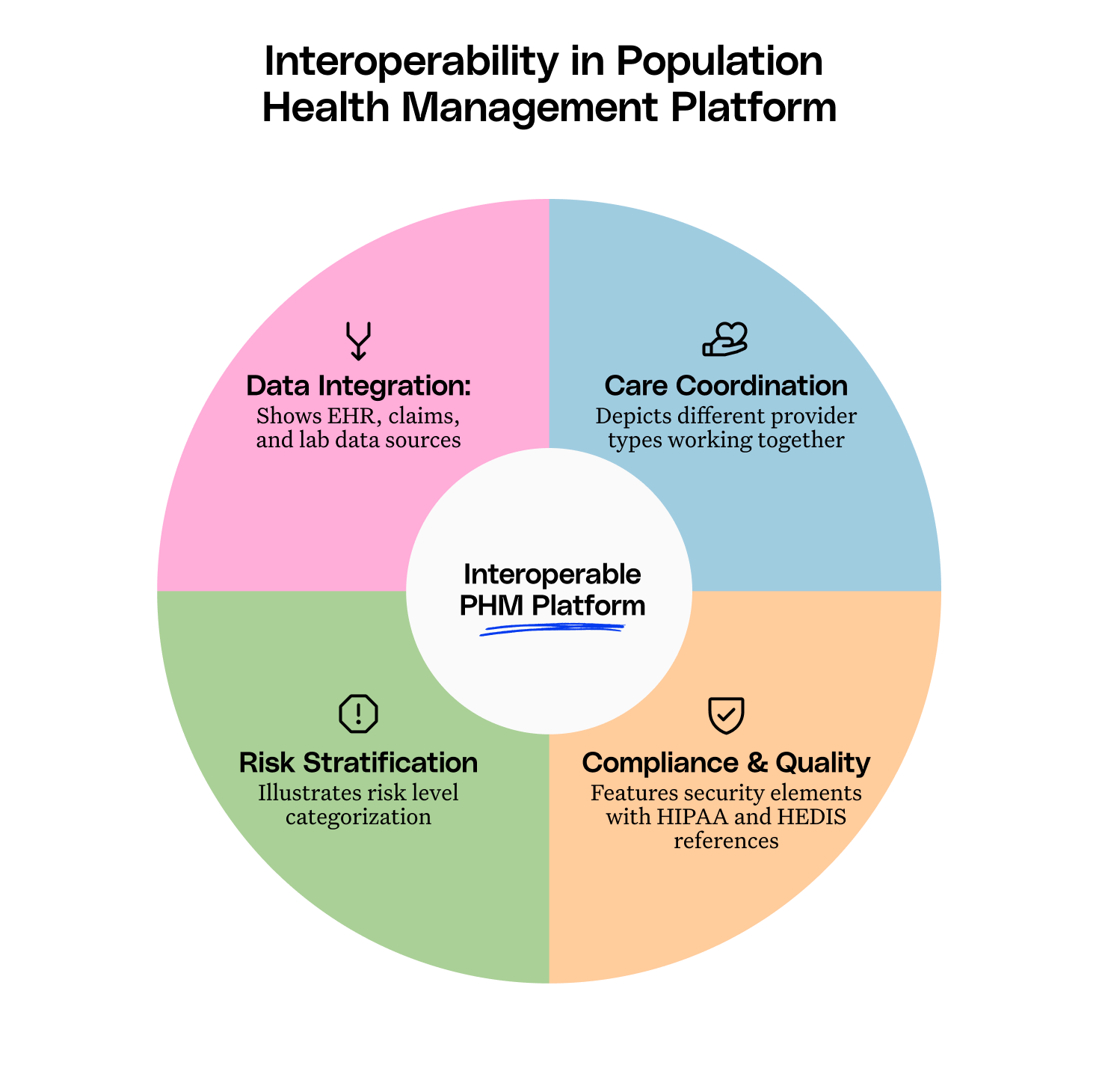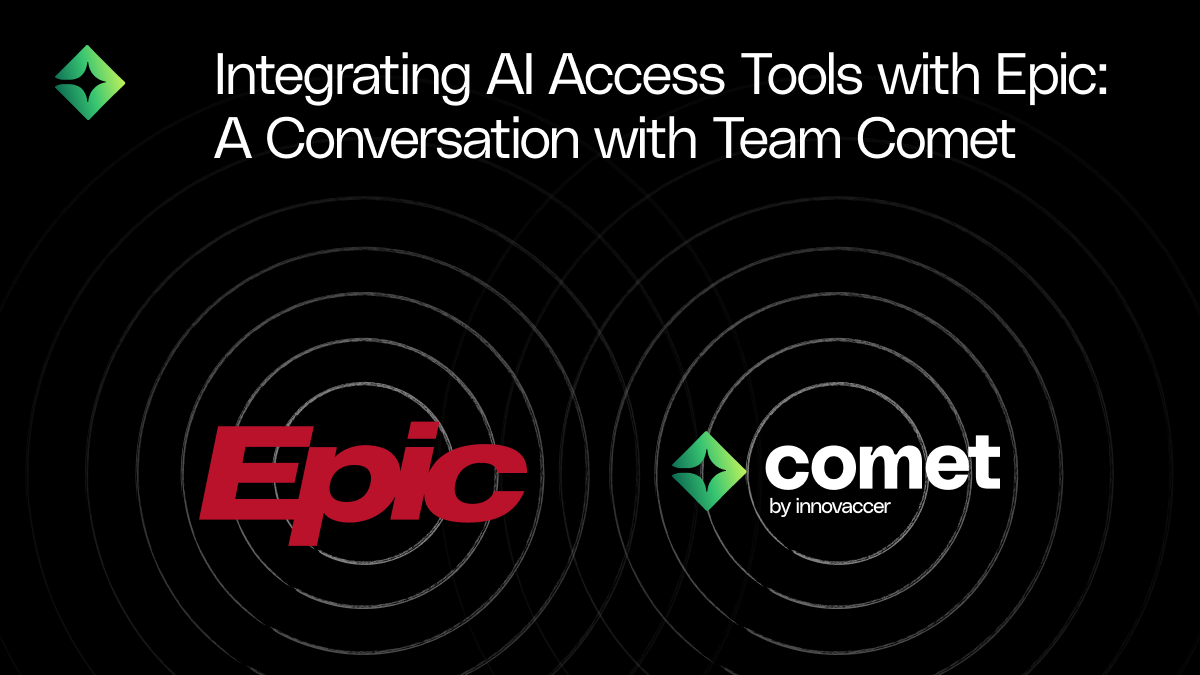Understanding Interoperability in Population Health Management Software

.png)
Envision a healthcare setting where care teams have full visibility into each patient's pathway. No more siloed data. No more coding mistakes. This is not a fantasy anymore, it’s the new reality achieved through innovation.
Interoperable population health management software has revolutionized what previously seemed impossible. Such platforms allow medical teams of various specialties to collaborate effortlessly, exchanging real-time patient information without any complications or delays.
In our value-driven care system, this technology isn't just positive - it's required. Through encouragement of collaboration and offering integrated patient insights, interoperable PHM solutions are driving healthcare delivery up to optimal potential and enhancing providers' and patients' outcomes.
Read the blog to explore how this transformation is bringing about a change and why interoperability stands at its core.
What is Population Health Management (PHM) Software?
Population health management software is a set of digital tools that are designed to improve the health outcomes of a patient. These digital tools integrate data from different healthcare sources, such as electronic health records (EHRs), labs, and social determinants of health (SDOH), and unify it on a single platform.
The goal of PHM software is to provide proactive, value-based care through preventive solutions that reduce the risk of a patient. Key features of PHM software include:
- Risk-sharing models: PHM software uses an advanced healthcare analytics model to bifurcate patients based on their risk profiles.
- Data Integration: Unifies data from disparate sources into a single platform, powering whole-person care and informed decision-making.
- Care coordination: With the right tools, providers can collaborate with stakeholders to assess and track the historical data of a patient.
- Patient engagement: The software empowers patients to take control of their health. It even allows them to schedule appointments and communicate with their care teams.
Why Interoperability Matters for PHM Software & Key Features That Enable It
Interoperability helps in eliminating data silos (isolated data systems where information is stored separately), giving a 360-degree view of a patient. This enhanced visibility helps the care team to make better and informed decisions. The data help providers, researchers, and public health managers improve patient experiences that eventually help them improve a patient's care journey.
This transformative approach offers major benefits throughout the care journey, helping both care providers and patients in different ways.

Key Features of Interoperable PHM Software
By breaking down data silos and simplifying information exchange, interoperable PHM software helps in improving patient outcomes and reducing care costs.
- Centralized Data Integration from Diverse Sources- Integrating patient information from various sources into a single platform. These sources may include electronic health records (EHRs), labs, and claims data.
- Real-time Data Exchange- Helps improve care coordination by sharing real-time data across diverse care systems. This helps care managers to collaborate effectively and reduce care gaps.
- Improving Risk Stratification and Predictive Analytics- Using advanced analytics, healthcare organizations can identify and differentiate patients based on their risk scores.
- Care Coordination Tools - Interoperable PHM software provides tools like automated workflows and shared care plans that allow care teams to stay aligned. This ensures timely interventions and personalized care journeys across care organizations.
- Compliance and Quality Measurement- Security and privacy become most important as patient information flows across care systems. Thus, it becomes mandatory to adhere to HIPAA compliance, CMS interoperability mandates, and HEDIS measures.
Despite progress, challenges still persist. As healthcare continues to shift toward value-based models, the ability to share meaningful patient data across systems remains essential.
Also, read: How Population Health Management Software is Transforming Care Coordination!
Challenges in Achieving Interoperability in Population Health Management (PHM)
While interoperability is essential for effective Population Health Management (PHM), achieving it across a complex healthcare system is equally difficult. Organizations face several challenges in connecting and integrating data from diverse sources.
- Data Silos and Fragmentation
One of the biggest obstacles to interoperability is the existence of fragmented data that prevents the free flow of information. These fragmented data make it difficult to create a unified patient record, leading to incomplete patient information and increased care gaps. - Regulatory Barriers: The healthcare industry is constantly evolving, with new FHIR mandates, CMS regulations, and state-level data-sharing requirements. Keeping up with these changing rules demands significant resources, technical upgrades, and compliance efforts, making interoperability adoption a challenge.
- Scalability Issues: As patient populations grow, so does the volume and complexity of data that healthcare organizations must manage. Without a scalable interoperability solution, integrating large datasets from multiple sources can slow down operations, increase costs, and impact care delivery.
Overcoming these challenges requires advanced technologies and a commitment to breaking down barriers.
Transforming Population Health with Innovaccer’s Interoperability Driven Solution
Innovaccer's AI-powered PHM solution helps in achieving seamless data integration across different health systems. Its Data Activation Platform (DAP) stands out for its ability to unify fragmented data sources, streamline clinical workflows, and enhance real-time decision-making capabilities, enabling healthcare organizations to make proactive and data-driven outcomes.

The platform’s PHM software equips healthcare teams with the tools needed to optimize value-based care (VBC) performance. It helps in identifying and closing care gaps at every patient touchpoint. The platform ensures timely interventions and improved health outcomes. Its AI-powered automated documentation helps save time and reduce clinician burnout by 75%. Additionally, the software offers a real-time view of the care provider’s performance across different utilization metrics, enabling organizations to drive success in a value-based system.
Innovaccer has also been recognized as the top-rated AI-powered population health management (PHM) vendor in the 2025 Black Book Research survey.
Read the full story
The solution has earned the highest marks for its data integration, predictive analytics, and impact on healthcare optimization.
Future Trends and Innovations in PHM Interoperability
As healthcare continues to evolve, interoperability in Population Health Management is advancing through advanced technologies and patient-centered approaches. The increasing use of AI and Machine Learning is transforming how healthcare provides personalized care across the population. The adoption of cloud-based PHM platforms offers the flexibility to integrate data from multiple sources and support remote access for care teams.
Interoperability is no longer a technical concept; it has now become essential for modern healthcare. By enabling seamless information exchange, interoperable systems provide the comprehensive patient visibility that care teams need to deliver timely, coordinated, and personalized care.
Together, these innovations are reshaping population health management strategies, creating a comprehensive healthcare ecosystem. Designed to improve outcomes, enhance patient experiences, and reduce the total cost of care.
To know more, request a demo today!


.png)



.png)



.avif)









.svg)
.svg)

.svg)

